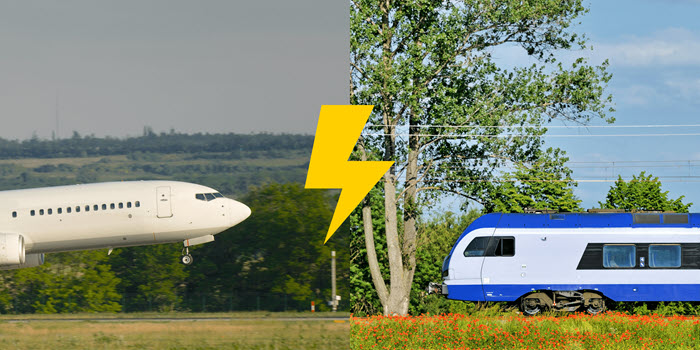
In the collective imagination, and for too many people, the plane is much more efficient than the train. Too expensive, too slow... Numerous arguments are used by people who are resistant to the train. In this article, we wanted to put an end to these preconceived ideas and show that, on the contrary, the train has some nice surprises in store for us...
The train, not necessarily longer
that the aircraft
In terms of actual travel time, the plane is faster than the train: the top speed is much higher.
However, travelling by air generates 'hidden' times, which add considerably to the journey time. While the train offers quick and easy boarding, security checks and/or boarding, and the journey to the airport (outside the city) can make the total journey time longer. On short-distance journeys, this is even impressive. For example, if you leave from the Châtelet-Les-Halles metro station (central Paris) to reach the Place de la Mairie in Rennes, the time is doubled by plane (3h21 compared to 1h44)!
As a general rule, according to the Climate Action Network (CAN), the train is faster for journeys of 4 hours or less. The plane is still better than the train for certain journeys (long journeys, cross-country journeys, etc.). But even for these journeys, the train can have additional advantages:
- The fleet of night trains in Europe is starting to expand more and more, which will make longer journeys a snap (at least for those who are heavy sleepers)
- The train also has the advantage of having "useful" time: this time can be used to work, read, discuss. It is a moment that can be used by travellers as real relaxation time, rather than wasted time.
The train is on average cheaper than the plane
As you return from your holidays, some of you may have been confronted with exorbitant prices offered by the SNCF, while the same journeys by plane cost less (rather counter-intuitive). This argument does not make it any easier to change to the train, even though it is less carbon intensive than flying.
Is this the tree that hides the forest? According to several studies, yes. Indeed, according to a study by the Transport Regulation Authority, reported by Le Monde, air travel costs an average of 15 cents per kilometre, compared with 11.9 cents for the TGV (around 8 cents per kilometre for the TER and Intercity trains). For low-cost airlines, the difference is more tenuous, but
the train still wins: 5.4 ct/km for the train against 5.8 ct/km for the plane.
The high prices that SNCF users may experience can be explained by the date of purchase, the time and day of departure, and the time of year. These factors also apply to air travel, following the same logic.
In addition, there are other hidden costs of flying that are not included in the above average (taxi or shuttle to the airport, hold luggage, insurance, etc.).
And in terms of "carbon cost", there is no real match since the train is about 75 times less polluting than a plane (in terms of CO2). So with these 3 good reasons, the question no longer arises, take your seat on the next train towards the Ecological Transition!

This article was written by Hugopure product of the South-West (Certified Organic Agriculture)
MPP THEMES
The next themes

